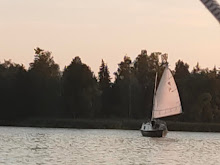Pomysł na nowy cykl wpisów: fragment wywiadu z, artykułu o albo opisu jakiegoś muzyka, do tego może kilka słów o jego działalności albo lista płyt wartych uwagi. Generalnie taki wpis można traktować jako punkt wyjścia do dyskusji na temat jego bohatera.
Powiedzmy, że jeszcze na fali audycji zaczynamy od Ralfa Wehowsky'ego.
When the Neue Deutsche Welle appeared about 1979 there was a big misunderstanding: many took the art school rhetoric of (some of) their English or American protagonists as if it was meant seriously: the Dada quotations, constructivist covers etc. Of course for the most of them it was just the PR hype of the day; today it's cool to quote Schwitters, tomorrow Deleuze and then Iacocca. The good thing about it was the change in the cultural climate, which made it possible to join the public discourse from a position coming from and developing these countercultural traditions.
If I might be allowed a little diversion, I believe there is a long cultural tradition, which can be found throughout the 20th century and now continues into the new millennium, one which belongs neither to pop culture nor to "high" culture but breaks into both of those fields. The main characteristics of this tradition are being critical, i.e. not being satisfied with the world as it is (nor with culture and music as it is), and using music (or other art forms) to explore and deal with reality including the way we perceive reality. This leads to consequences which are incompatible with the central tenets of pop or "high“ culture: There is no interest in functional music/muzak: music to dance to, march to, sing along to, or go shopping to (which is the function of 99% of pop music after all), nor is there interest in respecting the conventions of musical systems that evolved to please the clergy and the aristocracy. Being able to criticise needs knowledge about the objects of criticism and about its tools, reason and language, which become objects of criticism too. A fine early example of this can be found in Dada, which didn't just attack social and political nuisances but language itself, with lautgedichten (sound poetry) that I wouldn't hesitate to describe as music. Another consequence is being aware of the relations between form and content and their history. There are also forms and methods that have worn out; for example, chord progressions express nothing anymore today. They've degenerated into clichés. Basing a track on steady 4/4 time indicates stupidity as sure as death.
Dealing with music as a means of confronting reality leads to the consequence that there can't be one musical "style", a linear progression or a properly defined line of ancestors. Reality and constructions of reality not only change in time; they also differ horizontally and vertically at any given time. This may be one of the reasons why this position as one approach regularly is being ignored. Of course the whole thing is not a 20th-century invention; I only think it makes sense to concentrate on such a rather short period, especially as the speed of technological and sociocultural changes is so enormous.
Standing in a tradition that has rule breaking as one of its most important rules it was clear that a new movement, which started with the rhetoric of rule breaking was a good vehicle for own operations. In other words, the main difference between us and most other groups of the Neue Deutsche Welle was that we knew what we were doing.
(wywiad Dana Warburtona, paristransatlantic.com)
Ten wywiad jest świetnym wprowadzeniem w historię Wehowsky'ego, opowiada tam o wszystkich mutacjach PD/PiDi/P16.D4, ich metodach pracy, swojej działalności poza zespołem.
Polecanki:
P16.D4 - Kühe In 1/2 Trauer (Selektion, 1984)
P16.D4 - Distruct (Selektion, 1984)
Ralf Wehowsky, Lionel Marchetti - Vier Vorspiele / L'Oeil Retourné (Selektion, 1994)
RM74 / RLW - Pirouetten (Crouton, 2006)
Bhob Rhainey / Ralf Wehowsky - I Don't Think I Can See You Tonight (Sedimental, 2007)
bardzo jestem ciekaw Un Ocean De Certitude z Bernhardem Günterem, Patryk w audycji puszczał fragmenty z płyt z Bruce'm Russellem, które też brzmiały obiecująco.


Brak komentarzy:
Prześlij komentarz